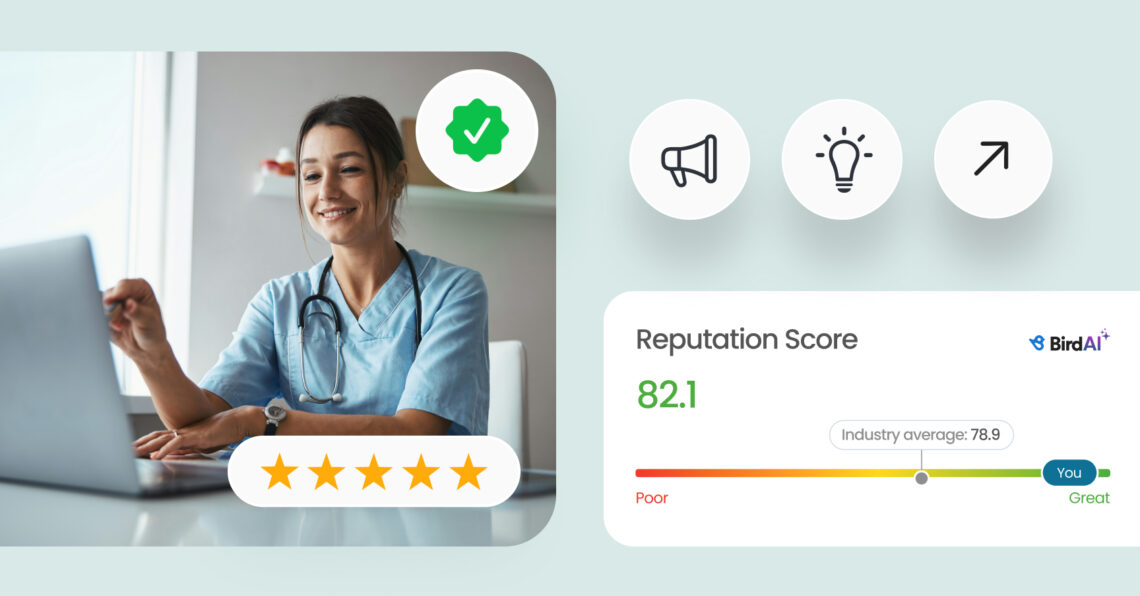One negative review can be enough to sway dozens of potential patients away from a healthcare provider. In fact, according to Birdeye’s State of Google Business Profile 2025, 81% of all patient-facing reviews now appear on Google, making online reputation a deciding factor in patient choice.
That’s why healthcare reputation management software has become indispensable. It goes far beyond collecting star ratings. The right platform helps providers protect credibility, meet compliance requirements, and showcase the quality of care patients expect.
With most people checking reviews and local search results before booking appointments, reputation is no longer a back-office concern; it’s a frontline strategy for patient acquisition and retention.
In this blog, we will break down why reputation management is vital for healthcare providers and discuss the top 10 healthcare reputation management software platforms that help organizations safeguard and grow their online presence.
Table of contents
- Why healthcare reputation management is critical for providers
- How to choose the right healthcare reputation management software
- Top 10 healthcare reputation management software in 2026
- Key trends in healthcare reputation management in 2026
- How Birdeye helps healthcare providers improve online reputation
- Frequently asked questions on healthcare reputation management software
- Conclusion
Why healthcare reputation management is critical for providers
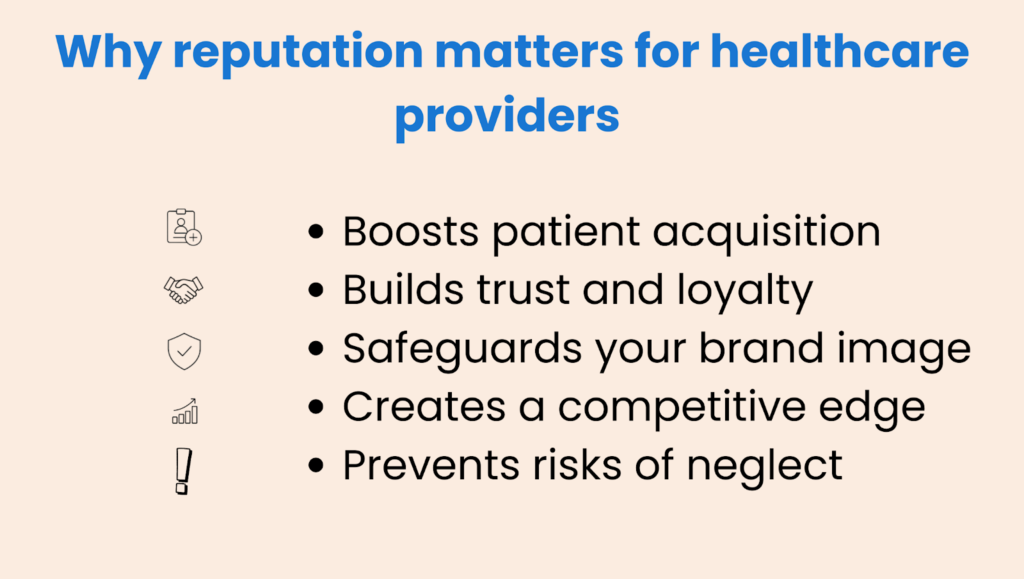
Reputation impacts every aspect of a healthcare practice, from the initial online impression to the lasting relationships formed with patients. It affects visibility, credibility, and even long-term growth. Let’s explore the main reasons why managing it effectively is essential.
1. Increases patient acquisition
A visible record of positive experiences helps bring new patients through the door. When reviews and listings highlight quality care, patients are more likely to choose that healthcare provider over others in the area.
2. Drives patient trust, satisfaction, and loyalty
Acknowledging feedback shows accountability and care beyond the clinical experience. Patients who feel heard are more inclined to return for ongoing treatment and recommend the provider to friends or family.
3. Protects your organizational image from online threats
Every healthcare practice is vulnerable to misinformation, outdated information, or negative publicity. By addressing these issues promptly and consistently, providers safeguard their reputation and maintain credibility.
4. Achieves a competitive edge through proactive reputation building
In markets where multiple healthcare providers offer similar services, reputation often becomes the deciding factor. Highlighting positive stories, encouraging reviews, and keeping profiles up to date give practices a measurable advantage.
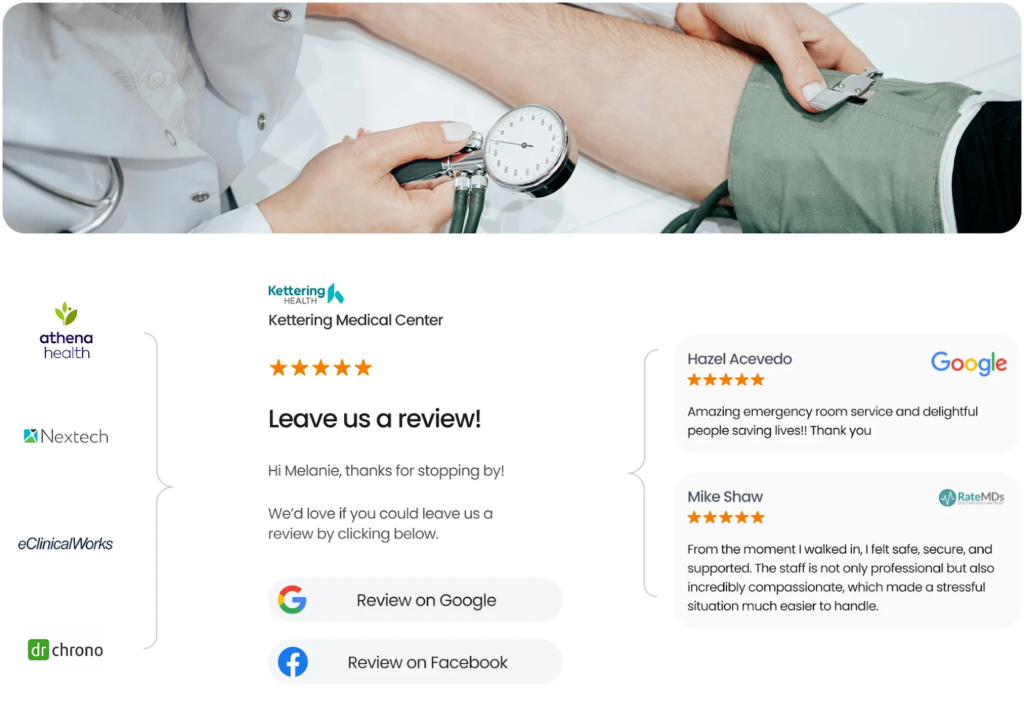
5. Avoid the pitfalls of a neglected digital reputation
Without consistent oversight, negative feedback can outweigh positive experiences in shaping perception. This can discourage prospective patients and make it harder to rebuild trust later.
In short, reputation management provides healthcare providers with a structured way to highlight their strengths, build trust, and ensure that the care they deliver is accurately reflected online.
How to choose the right healthcare reputation management software
With dozens of healthcare reputation management platforms available, finding the right fit can feel overwhelming. The good news? A few key factors can help providers narrow down the options and choose a healthcare solution that truly supports their reputation goals.
Let’s walk through what to keep in mind.
1. Essential features to prioritize in 2026
The best tools go beyond collecting reviews. They centralize feedback, request reviews automatically, monitor listings, and provide analytics to track progress. Leading platforms also use AI-driven insights like sentiment analysis and predictive reporting to help providers spot trends and improve patient experience. These features make it easier to manage reputation consistently across all channels.
2. Ease of use and scalability: single vs. multi-location practices
A solo practice may only need simple review requests and quick response tools. Larger groups, however, benefit from dashboards that manage multiple locations, role-based access for staff, and consolidated reporting. Think about your current size and where you plan to grow.
3. Seamless EHR/PMS integration & local listings management
Software that connects with your EHR or practice management system reduces manual work. Integration ensures patient data flows smoothly, making it easy to trigger review requests after visits. Alongside this, accurate listings management keeps your name, address, and hours consistent across Google and other directories.
4. HIPAA compliance and robust security protocols
Protecting patient information is non-negotiable. Choose software that offers HIPAA compliance, signed agreements, and strong data security standards. This ensures both compliance and patient confidence in your digital communication.
5. Communication tools: SMS, chat, and alerts
Reputation management is not only about reviews, it’s also about how quickly you respond. Tools with SMS, web chat, and real-time alerts help staff reply to patient questions and address feedback before it escalates.
6. Pricing models, support quality, and real-world ROI
Pricing can vary widely, so look beyond the monthly fee. Consider the level of support offered, onboarding help, and whether the software has proven results such as increased reviews, higher search visibility, or improved patient satisfaction scores.
7. Follow a step-by-step decision checklist
Here’s a simple way to guide your choice:
- Identify your goals (reviews, listings, patient communication).
- List must-have features and integrations.
- Confirm HIPAA compliance and security.
- Test the ease of use during a demo.
- Compare pricing alongside case studies or ROI proof.
Pro tip: Ask the vendor for a scenario-based demo showing multiple locations or complex patient workflows; it often reveals real usability issues.
Selecting the right healthcare reputation management software is not just about features; it’s about finding a solution that matches your practice’s needs today while supporting growth for the future.
Top 10 healthcare reputation management software in 2026
Choosing the right healthcare reputation management software is crucial for practices looking to strengthen their presence in a digital-first healthcare environment. With patient decisions increasingly influenced by online reviews and local search visibility, healthcare providers need robust tools that simplify review collection, automate patient engagement, and protect their brand reputation across multiple platforms.
We have curated a list of the top 10 healthcare reputation management software solutions in 2026, tailored to meet the needs of practices varying in size, specialties, and technological maturity.
Before reviewing each solution, here’s a quick comparison table to help you get an overview:
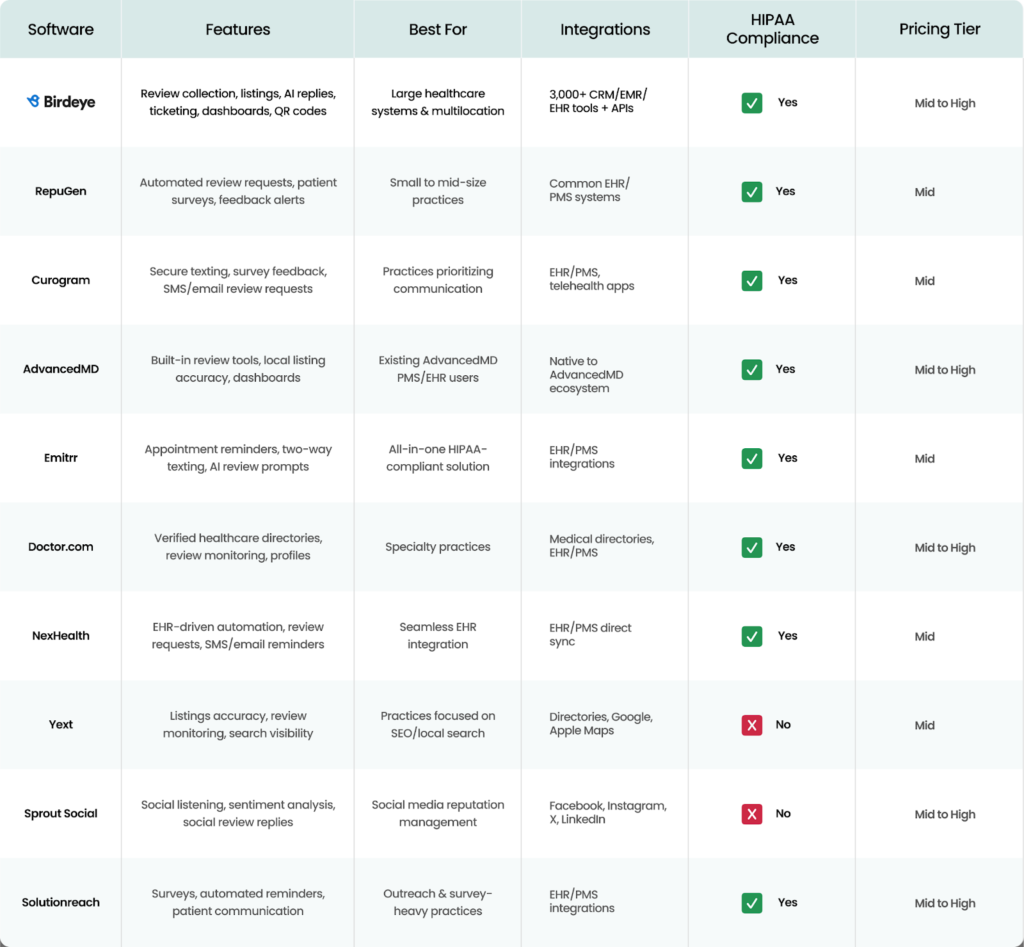
Now, let’s explore each platform in detail:
1. Birdeye – best for large healthcare systems
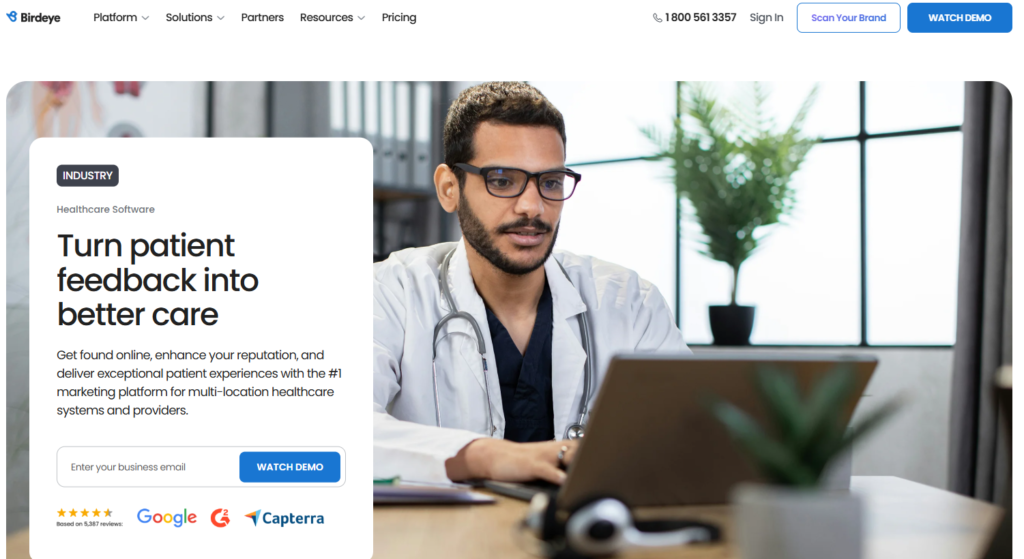
Birdeye is an Agentic marketing platform for multi-location healthcare organizations, offering seamless integration with 3,000+ CRM, EMR, and business tools, plus APIs for niche connections. It supports real-time review collection from major sites, integrates with EMRs for a full view of patient feedback, and uses HIPAA-compliant ticketing to resolve concerns quickly. With automated SMS/email engagement and analytics dashboards, Birdeye helps healthcare systems increase reviews, improve local search visibility, and enhance patient satisfaction.
A real-world example of how Birdeye’s healthcare reputation management software delivers results can be seen in its partnership with Total Point Healthcare, a growing network of emergency rooms and urgent care centers across Texas.
Total Point Healthcare’s success with Birdeye’s reputation management tools
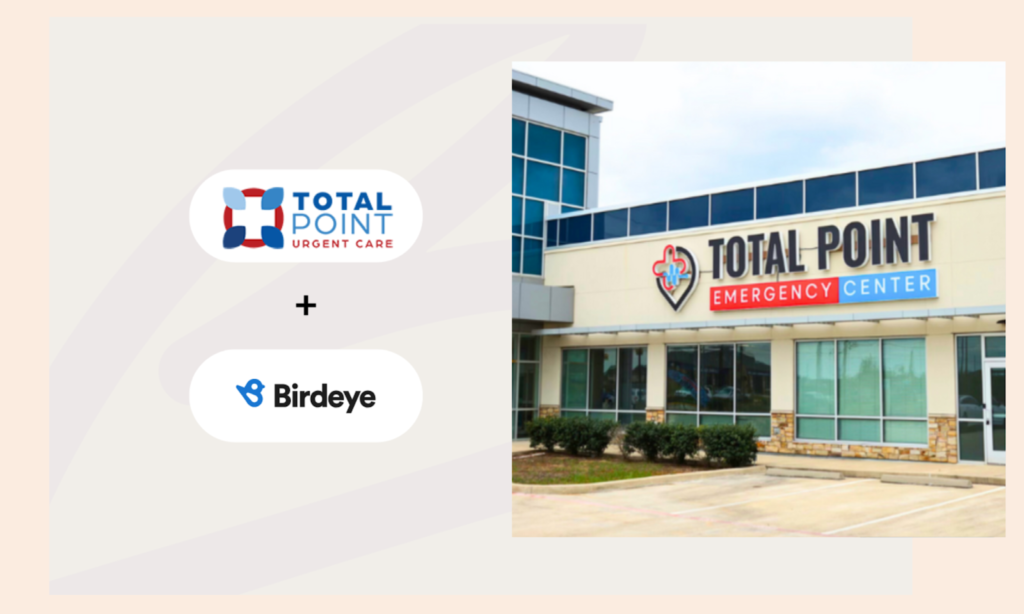
By adopting Birdeye’s review management and listings tools, along with QR code–based review requests, Total Point achieved a 486% increase in reviews, 62.5K Google profile impressions, and a 36% scan-to-click rate from in-facility QR codes. With Birdeye’s multilocation dashboard, they seamlessly monitored and responded to reviews across 20 locations, maintained a 4.6-star rating, and uncovered improvement opportunities through sentiment analysis. This case highlights how healthcare reputation management software can support both growth and patient trust across multiple communities.
2. RepuGen – best for small to mid-size practices
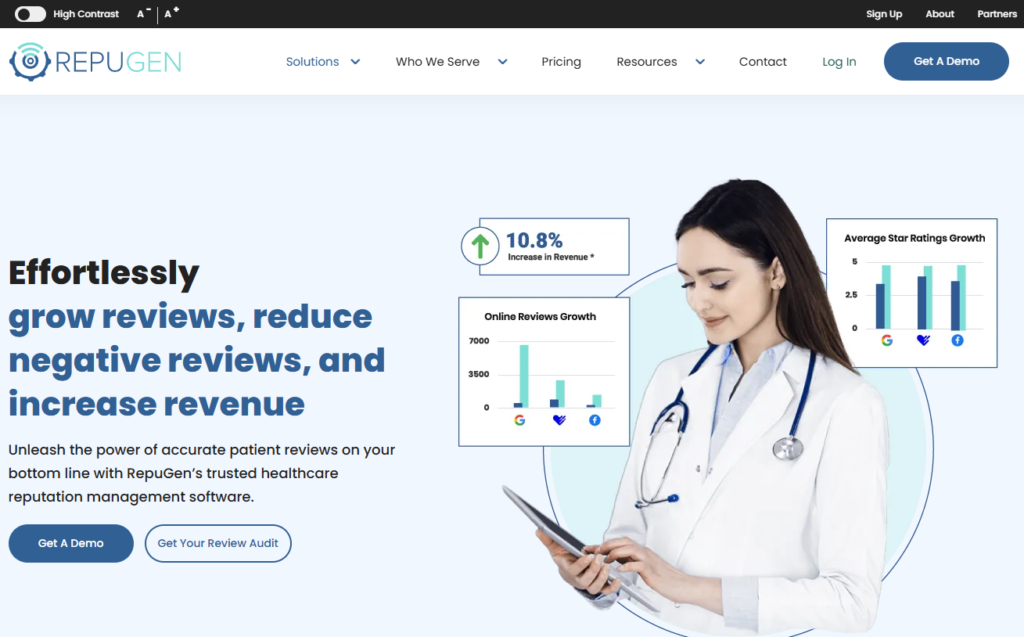
RepuGen makes reputation management simple for smaller practices. Its automated review campaigns, patient satisfaction surveys, and HIPAA-compliant workflows help providers gather feedback without extra admin burden. Integration with common EHR/PMS systems enables smooth adoption, and its survey-driven focus helps practices identify unhappy patients before issues escalate.
3. Curogram – best for patient communications and reviews
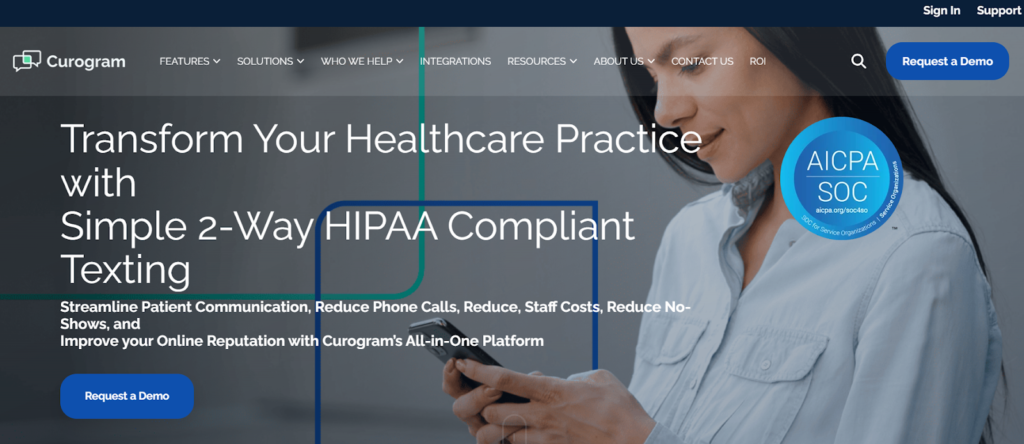
Curogram blends secure messaging with review management, making it ideal for providers that want centralized patient communication. Post-visit surveys and automated SMS/email review requests allow practices to gather timely feedback. With HIPAA compliance and real-time alerts, providers can address concerns quickly while building trust through responsive engagement.
4. AdvancedMD – best for practices already using AdvancedMD PMS/EHR
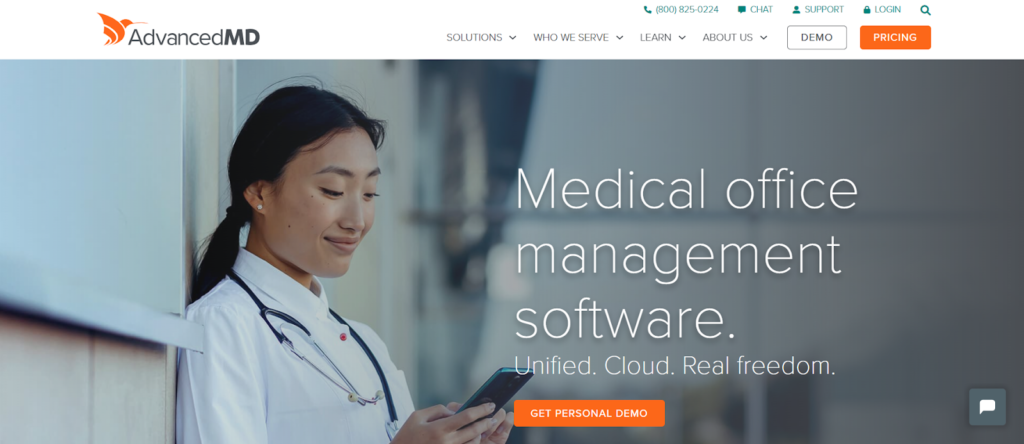
For practices already on AdvancedMD’s platform, built-in reputation tools extend its functionality. Automated review requests, local listing accuracy, and HIPAA-compliant communication features help maintain consistent patient feedback cycles. Multi-location support and a unified dashboard reduce manual tracking and support practice growth.
5. Emitrr – all-in-one HIPAA-compliant solution
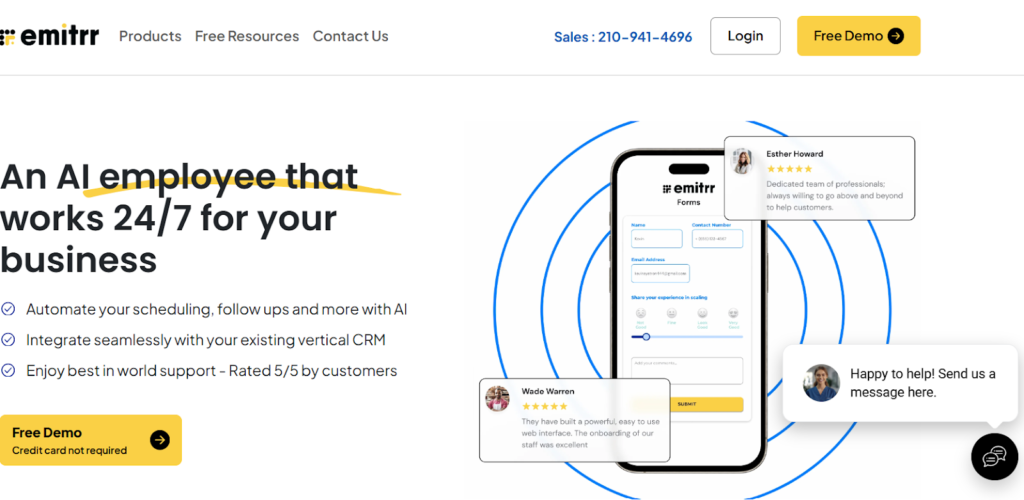
Emitrr combines appointment reminders, two-way texting, and review management in a HIPAA-compliant platform. AI-driven review prompts and response suggestions save time for staff, while real-time monitoring ensures no patient feedback goes unnoticed. Practices value its affordability, scalability, and dedicated support.
6. Doctor.com – best for specialty practices
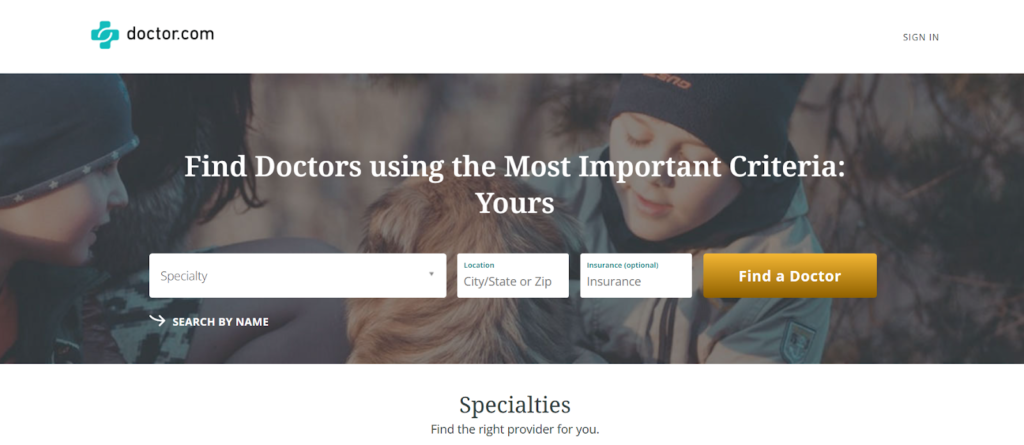
Doctor.com is tailored to healthcare, helping providers showcase verified profiles across directories and collect reviews from trusted medical sites. Its listing accuracy and healthcare-specific integrations give specialty practices greater visibility. Review monitoring and patient communication features further support long-term reputation growth.
7. NextHealth – best for EHR integration
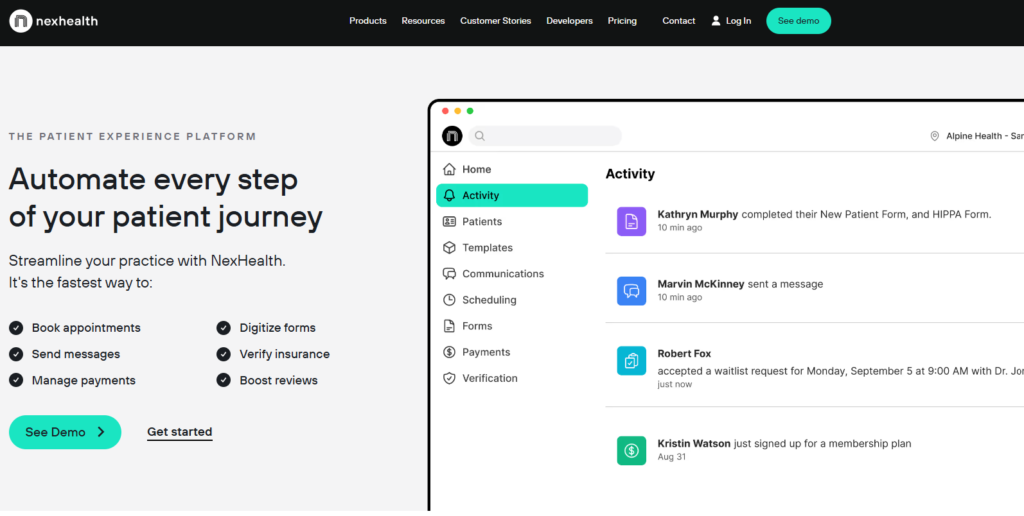
NexHealth integrates directly with EHR/PMS systems, automating review requests after appointments. Its HIPAA-compliant communication tools include email, SMS, and reminders, creating a seamless feedback loop. Practices benefit from reduced admin work and improved patient response rates.
8. Yext – Best for Listings and Local SEO
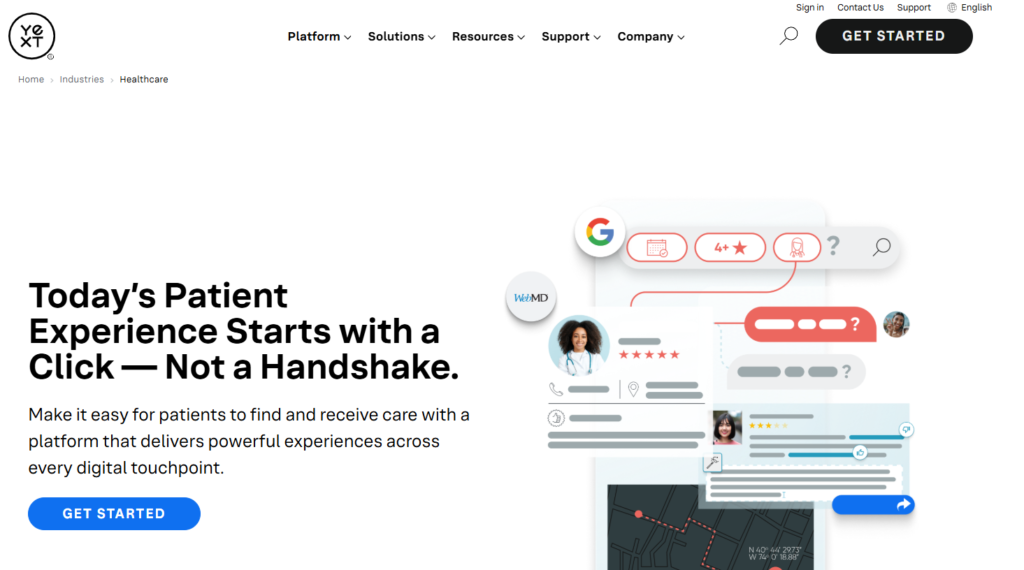
Yext ensures healthcare providers maintain accurate, consistent practice information across search engines and directories. Its listings strength pairs with review monitoring to improve visibility in local search. Automated alerts keep providers informed, while verified profiles increase patient acquisition.
9. Sprout Social – Social media reputation management
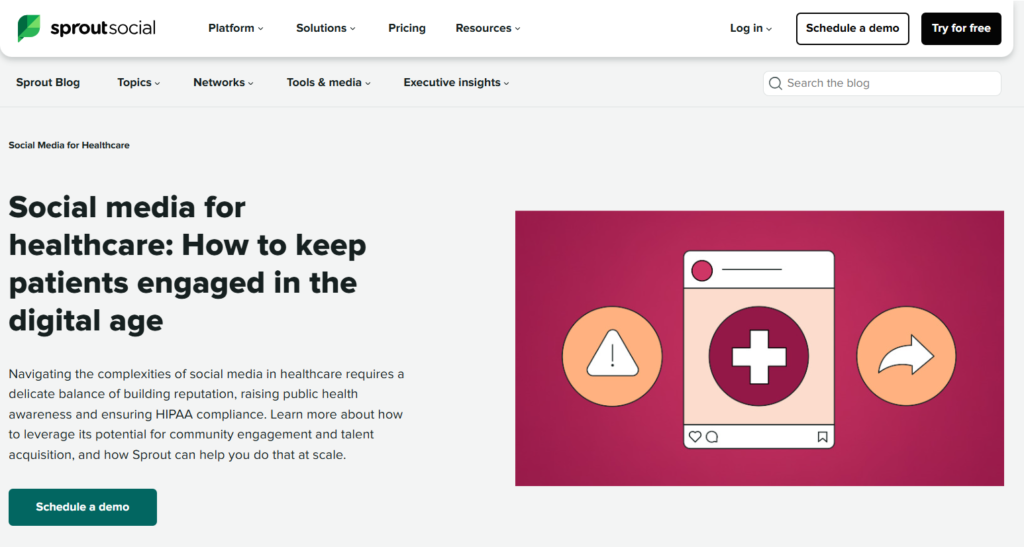
Sprout Social supports providers that want to engage patients on social platforms. Its AI-powered monitoring captures reviews, mentions, and comments in real time. Healthcare practices can use it to deliver personalized responses, track sentiment, and analyze social impact on patient engagement.
10. Solutionreach – best for patient outreach and surveys
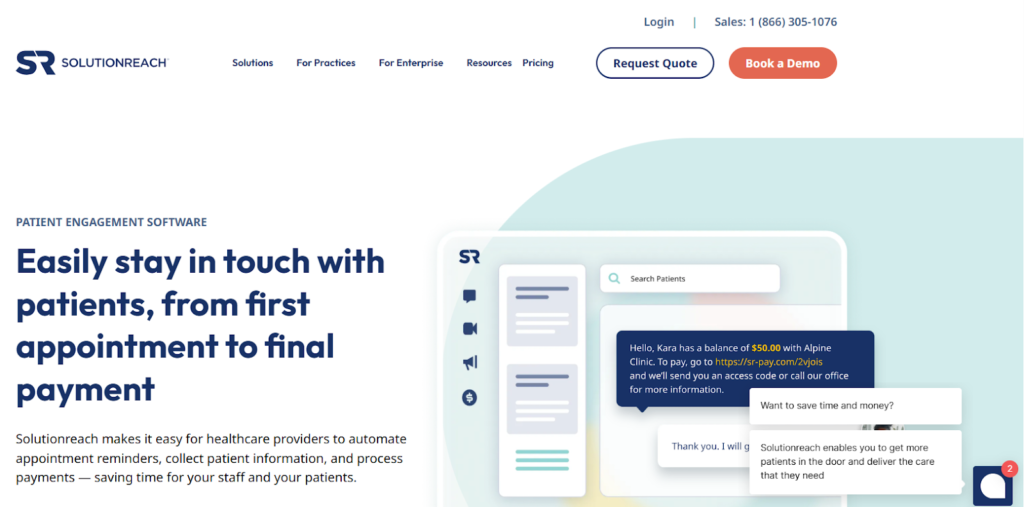
Solutionreach emphasizes patient communication through automated reminders, feedback surveys, and review requests. Its HIPAA-compliant tools centralize engagement while helping providers measure satisfaction trends. For practices that prioritize surveys and ongoing communication, it offers a well-rounded approach to reputation growth.
Selecting the right healthcare reputation management software is a strategic investment that can significantly influence patient acquisition, retention, and overall trust in your practice. By leveraging tools that combine automation, AI insights, and HIPAA-compliant communications, healthcare providers can maintain a resilient online presence, proactively manage patient feedback, and build long-term loyalty in an increasingly competitive landscape.
Discover Top 10 Healthcare Reputation Management Software
Want to see the impact of Birdeye on your business? Watch the Free Demo Now.
Key trends in healthcare reputation management in 2026
Reputation management in healthcare is no longer limited to collecting reviews. In 2026, providers are focusing on smarter tools, better patient engagement, and stronger safeguards to protect their digital presence. Here are the key trends shaping this shift.
1. AI-driven sentiment analysis and workflow automation
AI is helping providers make sense of large volumes of patient feedback by identifying patterns in sentiment and highlighting areas of improvement. Automation ensures that review requests are sent at the right time, concerns are flagged quickly, and responses remain consistent across locations.
2. The growing role of Google Maps, reviews, and local SEO
Patients often discover healthcare providers through search results and maps. Maintaining complete and accurate profiles, responding to reviews, and keeping listings updated have become core parts of reputation management. Visibility in local search now directly influences how patients choose a provider.
Note: Use tools that automatically sync listings across directories to save time and avoid inconsistencies.
3. Impact of social media and third-party review platforms
Conversations about patient experiences extend well beyond Google. Platforms like Healthgrades, Zocdoc, and social media channels contribute to how a practice is perceived. Reputation management software now monitors multiple platforms, allowing providers to engage where patients are most active.
4. Real-time engagement: instant responses and escalation workflows
Patients expect acknowledgement when they share feedback. Tools that provide instant alerts and escalation paths help staff respond quickly, prevent issues from worsening, and show patients that their concerns are taken seriously.
5. HIPAA-compliant review processes and data security
Reputation management in healthcare comes with added responsibility. Providers must protect sensitive information while encouraging open communication. Solutions that ensure HIPAA compliance and secure handling of data are now essential for building patient trust.
Tip: Even if your software is HIPAA-compliant, train staff on best practices for responding to reviews securely.
By understanding these trends, healthcare providers can select tools that not only safeguard their online presence but also enhance patient engagement and satisfaction, a need that platforms like Birdeye are designed to address.
How Birdeye helps healthcare providers improve online reputation
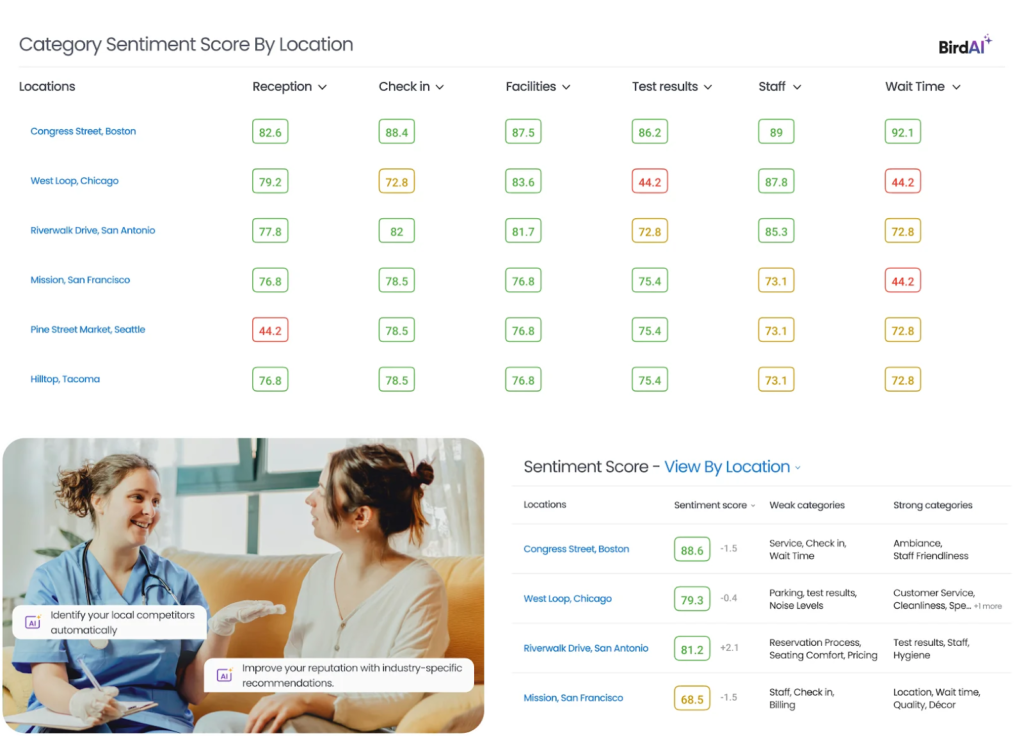
Birdeye is designed to help healthcare organizations of all sizes manage and strengthen their online reputation across multiple platforms. By combining automation, AI insights, and HIPAA-compliant workflows, Birdeye enables providers to turn patient feedback into meaningful improvements and visible credibility.
Here’s how Birdeye supports reputation management for healthcare providers:
1. Streamlined review collection
Birdeye integrates seamlessly with EHRs, CRMs, and other practice management tools to automate review requests via SMS, email, or QR codes. This ensures providers receive timely feedback from patients while reducing administrative effort. The result is a consistent flow of new, authentic reviews that reflect the quality of care delivered.
2. AI-powered review responses
Birdeye’s AI generates tailored, error-free responses to patient reviews with a single click. Whether thanking a patient for positive feedback or addressing concerns professionally, the platform helps practices respond quickly, maintain consistency across locations, and showcase accountability.
3. Multi-location reputation management
For healthcare systems with multiple clinics or departments, Birdeye’s dashboard consolidates reviews, ratings, and patient feedback in one place. Staff can monitor performance at both individual locations and system-wide levels, enabling consistent reputation management while identifying areas for improvement.
4. Accurate listings and enhanced local visibility
Birdeye’s Listings AI Agents ensure that a practice’s name, address, phone number, hours, and other key details are accurate across Google, directories, and social platforms. This strengthens local search presence, helps patients find the right location, and ensures the practice appears trustworthy in search results.
5. Patient engagement and proactive communication
Birdeye’s Messaging AI and Chatbot AI allow providers to engage patients across channels like text, email, web chat, and social media. Instant alerts and real-time communication help staff respond to questions, resolve issues promptly, and turn potential negative experiences into positive outcomes.
6. Insights-driven improvements
With Insights AI, Birdeye analyzes patient sentiment, flags recurring issues, and offers actionable recommendations. This enables healthcare providers to enhance operational workflows, improve patient experience, and improve service quality, demonstrating that reviews are not only collected but also actively used to enhance care.
7. HIPAA-compliant security
Birdeye ensures that all patient interactions, review data, and communication are handled securely and in compliance with HIPAA regulations. Providers can manage reputation confidently, knowing that sensitive information remains protected while delivering transparent communication.
By combining automation, AI insights, and secure workflows, Birdeye empowers healthcare providers to maintain a strong online reputation, develop patient trust, and showcase the quality of care they deliver across every location.
Frequently asked questions on healthcare reputation management software
Healthcare reputation management software helps providers monitor, collect, and respond to patient reviews, manage listings, and maintain a strong online presence through automation, feedback tracking, and timely engagement.
Patients rely on reviews and Google search visibility when choosing providers. A strong reputation builds trust, attracts new patients, and protects against misinformation or negative feedback.
Look for AI-powered review analysis, multi-location dashboards, automated review requests, EHR/PMS integration, HIPAA-compliant communication, local listings management, and real-time alerts.
AI identifies sentiment trends, flags critical concerns, generates personalized responses, and automates routine tasks, enabling staff to respond more quickly and maintain consistent patient engagement.
Yes. Integration automates review requests after visits, ensures smooth patient data flow, and simplifies feedback tracking without extra administrative work.
HIPAA-compliant platforms protect patient information while enabling secure review collection, communication, and feedback responses, ensuring trust and compliance with relevant regulations.
Conclusion
Healthcare reputation management software is no longer optional for providers; it’s a strategic necessity. The right platform does more than collect reviews; it turns patient feedback into actionable insights, safeguards compliance, and ensures accurate information is visible wherever patients search.
By adopting tools specifically designed for healthcare, providers can enhance patient trust, streamline acquisition, and maintain credibility across multiple locations and channels. As 2026 brings greater reliance on digital reviews and local search, the practices that invest in reputation management software today will be best positioned to build lasting patient relationships and guide how their care is perceived tomorrow.

Originally published
